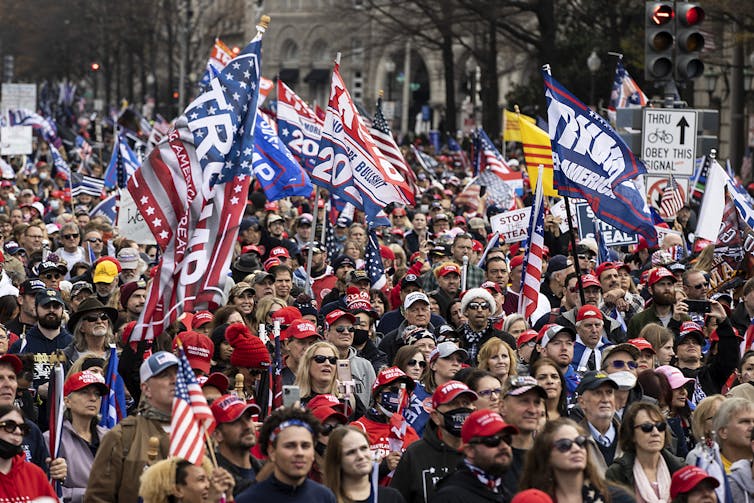Voters are starting to act like hard-core sports fans – with dangerous repercussions for democracy
- Written by Michael Devlin, Associate Professor of Communication, Texas State University
During Donald Trump’s presidency, the American electorate became more divided and partisan[1], with research suggesting[2] that the ongoing division is less about policy and more about labels like “conservative” and “liberal.”
Essentially, voters increasingly see themselves in one of two camps – a “red team” and “blue team,” each with a faction of hard-core members.
The dangerous extent of this devotion was on display when a mob of Trump supporters stormed the U.S. Capitol, convinced that the election had been stolen despite no credible evidence of widespread voter fraud[3].
How did American politics get to this point?
As sports communication researchers[4] who have written extensively[5] on the vast and powerful influence of identity on attitudes and behavior, we believe our work can offer some ways to understand recent events.
We’ve noted parallels between political identity and sports fandom that, when unpacked, point to some of the dangers associated with what we call “political fandom.”
Fandom can be central to identity
In sports, the spectrum of fandom is easily observable. Some fans might casually enjoy games simply while wearing their team’s shirt[6], whereas others ardently support and uproariously react to every play while cloaked in elaborate, outlandish outfits[7].
But fandom can go beyond outfits. It can become a core component of your identity – your sense of who you are.
Sports communication researchers[8] refer to this connection as “team identification,” a concept that transcends simply supporting a team and is, instead, characterized by a deeper, emotional attachment in which fans feel psychologically connected to their favorite team[9].
These fans – called “highly identified fans” – are more likely to express their love of their team on social media[10], attend events and consume more team-related media[11]. They’ll even buy team-related products[12] when they don’t particularly like the product itself. For the fan, it’s all about demonstrating allegiance.
Research shows that being a fan and belonging to a group can be beneficial to someone’s well-being[13]. But there can be a darker side to this kind of devoted fandom – particularly when a favorite team loses.
 Like baseball fans wearing the hat of their favorite team, supporters of Trump are decked out in campaign regalia.
Tasos Katopodis/Getty Images[14]
Like baseball fans wearing the hat of their favorite team, supporters of Trump are decked out in campaign regalia.
Tasos Katopodis/Getty Images[14]
Wins and losses become personal
In sports, the final whistle signals a game’s end.
But the level to which fans identify with their team can actually influence how they feel and act after the game has been decided. For highly identified fans[15], a win feels like a personal victory; a loss, on the other hand, feels like a personal defeat.
After wins, highly identified fans are more likely to bask in the glory of victory, tying themselves to the team through the use of language[16] like “us” and “we.”
For those same highly identified fans, a loss isn’t simply disappointing. Instead, it poses a threat to their identity and causes psychological discomfort[17] that leads to stress, depression and a greater willingness to confront others. They’ll often double down in support of their team. They might declare their team the best[18], regardless of the outcome. They’ll say the loss was a fluke and that external causes were to blame[19] – poor officiating, an injury or cheating by the other team.
As with sports, political identification and participation can occur on a spectrum[20]. Some people simply vote every election cycle for their preferred political party. Others, however, are heavily invested in the party and its candidates. They devour media, purchase campaign-affiliated merchandise and frequently flaunt their support in public and on social media.
After the 2020 presidential election, we wanted to know to what extent the concept of team identification applied to politics. We surveyed voters between Dec. 16 and Dec. 20, 2020, just days after the Electoral College vote confirmed Joe Biden as president-elect[21]. Administering a questionnaire that’s used by sport communication researchers, we were able to show “team identification” – when applied to politics – can help explain certain beliefs and behaviors after the election.
We found that 55% of Trump voters in our survey still falsely believed that Donald Trump had won the 2020 election. This result was significantly influenced by their level of team identification; voters who were highly identified Trump supporters were more likely to hold this false belief.
Of course, Trump, some members of Congress and conservative media outlets[22] reinforced those false beliefs by sharing baseless information alleging election irregularities and voter fraud.
When we asked highly identified Trump supporters if they were likely to distance themselves after the loss, we found they retained unfettered loyalty to Trump, similar to the way a sports fan would react after a big loss. When asked why Biden had been declared president-elect, overwhelmingly, they blamed everything but Trump, most often echoing Trump’s false voter fraud claims.
The ball is in the politician’s court
This issue, however, is not unique to Trump and his supporters.
Many politicians have devoted fans. Our results showed – perhaps surprisingly – that both Biden and Trump voters rated similarly in terms of their levels of political team identification.
To us, this signals the extent to which our politics have become polarized[23], with voters existing in separate camps that are unflaggingly devoted to their “team” and its leaders.
The onus, then, increasingly lies on politicians, whose words wield even more power[24] when their followers closely identify with them.
In sports, after losing a close playoff game, a star player can congratulate the other team and admit to being outplayed or can blame the refs and accuse the other side of cheating without offering evidence. The former reaction might temper the emotions of die-hard fans, while the latter could easily exacerbate their negative feelings.
 Vancouver Canucks fans riot after losing Game 7 of the 2011 Stanley Cup Finals to the Boston Bruins.
Bruce Bennett/Getty Images[25]
Vancouver Canucks fans riot after losing Game 7 of the 2011 Stanley Cup Finals to the Boston Bruins.
Bruce Bennett/Getty Images[25]
It’s important for political leaders to consider the influence of political fandom. After an election, conceding after the “final whistle has blown” is an important norm and tradition, while divisive rhetoric that fans the flames of false hope is a dangerous tack to take. After all, in sports, highly identified fans are much more likely to become aggressive[26] when they expect their team to win, only to witness a loss[27].
Politics, though, isn’t a game. And on Jan. 6, the world saw what happens when political fandom is harnessed and unleashed by unfounded, inflammatory rhetoric.
[Deep knowledge, daily. Sign up for The Conversation’s newsletter[28].]
References
- ^ more divided and partisan (www.pewresearch.org)
- ^ research suggesting (doi.org)
- ^ despite no credible evidence of widespread voter fraud (apnews.com)
- ^ sports communication researchers (scholar.google.com)
- ^ written extensively (scholar.google.com)
- ^ wearing their team’s shirt (images.app.goo.gl)
- ^ elaborate, outlandish outfits (images.app.goo.gl)
- ^ Sports communication researchers (doi.org)
- ^ fans feel psychologically connected to their favorite team (psycnet.apa.org)
- ^ express their love of their team on social media (doi.org)
- ^ and consume more team-related media (doi.org)
- ^ They’ll even buy team-related products (doi.org)
- ^ can be beneficial to someone’s well-being (bit.ly)
- ^ Tasos Katopodis/Getty Images (www.gettyimages.com)
- ^ For highly identified fans (www.people.vcu.edu)
- ^ through the use of language (doi.org)
- ^ and causes psychological discomfort (doi.org)
- ^ They might declare their team the best (doi.org)
- ^ and that external causes were to blame (doi.org)
- ^ political identification and participation can occur on a spectrum (www.pewresearch.org)
- ^ Electoral College vote confirmed Joe Biden as president-elect (apnews.com)
- ^ and conservative media outlets (www.usatoday.com)
- ^ politics have become polarized (www.pewresearch.org)
- ^ whose words wield even more power (www.jennifermercieca.com)
- ^ Bruce Bennett/Getty Images (www.gettyimages.com)
- ^ become aggressive (doi.org)
- ^ only to witness a loss (doi.org)
- ^ Sign up for The Conversation’s newsletter (theconversation.com)
Authors: Michael Devlin, Associate Professor of Communication, Texas State University

